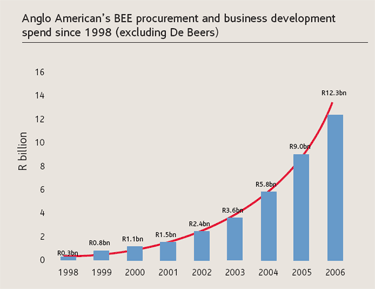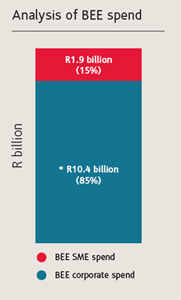|
Around the world, leading companies are working to ensure that communities and disadvantaged people are able to build sustainable futures off an economic foundation. The Group established Anglo Zimele in 1989 to promote economic participation and has used the experience gained to respond to the Mining Charter
in South Africa and development challenges in Chile.

Signing of the Heads of Agreement for the Anglo Coal and Inyosi Coal BEE transaction.
The transfer of a share of the ownership, management and benefits of the South African mining industry into the hands of people previously excluded from the economy is a government priority. This has been closely linked to the conversion of mining licences under new minerals legislation enacted in 2004.
A number of applications for the conversion of old order mining licences filed by Group companies are still outstanding, but we are optimistic that they will be achieved soon, without the need for legal challenges. Our associate, AngloGold Ashanti, has received a number of conversions. We have achieved significant success in that the majority of prospecting permits have been granted, especially within Anglo Coal.
Group companies completed a number of significant black economic empowerment (BEE) deals, including the award-winning Kumba deal, which saw the company split into Exxaro, now the largest black-owned and managed mining company listed on the JSE, and Kumba Iron Ore, an Anglo American subsidiary, which also listed on the JSE.
To date, Anglo American has undertaken BEE transactions to the value of R49.6 billion ($7.3 billion) – in real 2006 money terms – since 1994. With the transactions currently under negotiation this will ensure that Anglo American’s BEE ownership exceeds the 26% target set for 2014.
The Mining Charter sets a number of criteria against
which mining companies are measured. These include employment equity, human resource development, procurement, ownership, migrant labour, housing and communities, beneficiation, mine community and rural development.
Non-mining South African based companies with an annual turnover of R5 million or more are subject to measurement by the broad-based black economic empowerment codes which came into effect in February 2007. Smaller companies have lesser requirements. These codes encompass equity ownership, management control, employment, skills development, procurement, enterprise development and corporate social investment.
For a transitional period of a year enterprises that are not yet fully compliant will be measured only on their ownership and management elements.
The Mining Charter promotes corporate action in improving housing and living conditions. Given the critical shortage of housing in many areas, Group companies have created a number of schemes to ensure employees are well housed. Employees in Group companies are encouraged to own their own homes and live within family structures. Mortgage bond subsidy schemes are available to most employees. Anglo Platinum has set itself a 2009 target of reducing to zero the number of employees living in informal settlements. Its housing development schemes have created local benchmarks. Progress was also made on employee share ownership plans (ESOPs) with the launch of the Mondi plan early in 2006. Guided by the transformation leadership structures within the Group, subsidiary companies are establishing ESOPs which go beyond the South African government’s 2014 transformation deadline and provide for share ownership by employees currently outside of the executive schemes.
|
Anglo American is committed to ensuring that employees are an
integral part of its transformation strategy. ESOPs are being implemented across the Group as specific circumstances dictate:
Mondi’s ESOP enables employees to participate in 4% of Mondi Shanduka Newsprint and 5% of Mondi Packaging in South Africa De Beers’ HDSA empowerment deal includes a 13% share ownership by employees and pensioners -
Kumba’s HDSA empowerment deal includes a 3% ESOP in
Exxaro and Kumba Iron Ore
-
AngloGold Ashanti’s HDSA empowerment deal includes a
1.4% ESOP
-
Tongaat-Hulett’s HDSA empowerment deal includes a 7% ESOP
Hulamin’s HDSA empowerment deal includes a 5% ESOP -
Anglo Platinum is currently considering a 1.5% ESOP
Anglo American is considering an ESOP for South African employees, including those from Anglo Coal not included in
other schemes
|


About 26% or R11.4 billion
($1.7 billion) of South African procurement was from black-owned or managed enterprises compared with R8.2 billion ($1.3 billion) in 2005. Of this, 15% was from small and medium-sized enterprises with a less than R25 million
($3.7 million) turnover. The cumulative procurement from black-owned or managed companies since 1989 (real 2006 rands) is R38.4 billion ($5.7 billion).
Anglo American companies in South Africa are making good progress towards achieving the requirements of the Mining Charter. In addition to ownership, employment equity by historically disadvantaged South Africans (HDSA) is another key element. At
31 December 2006, Anglo American had already achieved an overall equity position of 39% against a 40% HDSA management target, which is required by 2009 in terms of the Charter. Challenges in fulfilling the required diversity targets in respect of gender and senior management are being addressed.
The rest of the elements of the Charter are being progressed in the Social and Labour Plans, which are produced for each operation or mining location. These form the basis of mining licence conversions.
Empowerment and economic development through enterprise are the cornerstones for Anglo Zimele’s activities. During 2006, a total of R34.4 million ($5.1 million) was invested in 18 new South African companies, across various sectors, which collectively employed more than 3,090 people in 2006 (2005: 2,522).
This brings the total number of current investments to 37. Of the total investment during 2006, R18.4 million ($2.7 million) was in equity (2005: R39.6 million/$5.8 million) and R16.0 million ($2.4 million) was in loans (2005: R28.3 million/$4.2 million). Total income derived from the investments was R10 million ($1.5 million) inclusive of a fair value adjustment of R4.4 million ($0.6 million). In 2005, this was R26.3 million/$3.9 million and R22.6 million/$3.3 million respectively. Income is re-invested, providing an ongoing source of revenue for Anglo Zimele.
Anglo Zimele focuses on procurement, business development and, through the Anglo Khula Mining Fund, facilitates the entry of commercially viable junior mining ventures into the mainstream of the sector. On the enterprise development front, the collective turnover of current investments of both Anglo Zimele and the Anglo Khula Mining Fund was R919 million ($135.7 million) compared with R777 million ($114.8 million) in 2005. In addition, Anglo Zimele advises other Anglo American regions and international organisations, such as the World Bank, on best practice in this field (case study on Chile below).
The Anglo Zimele team interacts closely with the Group’s divisional procurement departments and in South Africa assists with identifying suppliers that meet BEE criteria, to participate in our
supply chains.
Anglo Zimele also supports start-up or expanding businesses which exhibit commercial viability and growth prospects. Many of these companies find it very difficult to raise loans from commercial banks. Through the minority equity stake which it acquires, Anglo Zimele is able to work with the small or medium-sized enterprise’s board of directors and provide strategic guidance and skills transfer, including advice on business principles, corporate governance, strategy and providing loan finance.
Inspired by Anglo Zimele’s experience in South Africa, Anglo American Chile has launched an initiative to use local business development to improve economic and social conditions in the areas surrounding its operations.
The SEAT process, undertaken by the Casa de la Paz Foundation in 2004, highlighted social concerns about income inequalities in Chile. According to the Planning Ministry,
20% of the poorest families live with average monthly incomes that are lower than $215, while 20% of the wealthiest families earn monthly average incomes in excess of $3,000.
Experience has shown that many projects to support business development in some of Chile’s poorest sectors have not been able to move entrepreneurs beyond subsistence level or to a level at which they can successfully access the financial markets. With this in mind, the focus is on working in partnership with existing institutions where some success has been achieved.
An agreement has been signed with the Fondo Esperanza to extend their micro loans programmes to neighbouring communities. This is based on the methodology developed by Muhammad Yunus for which he won the Nobel Peace Prize in 2006. This project could benefit more than 1,800 entrepreneurs in poor communities over the next two years, with an investment of about $500,000. Depending on the success of the initial phase, the proposal allows for an expansion that would reach more than 4,700 entrepreneurs in three years, with an investment of about
$2 million.
An additional methodology for supporting entrepreneurs who have moved beyond subsistence and require more advanced assistance is being developed. Anglo American Chile and the Casa de la Paz Foundation have identified a portfolio of more than 20 projects, which are currently under consideration.
Thousands of women from African countries take part in the Face of Africa contest every year and the winner is rewarded with a top modelling contract. Local jewellery designers showcase their products and fashion designers use selected pieces to inspire dress designs for the contestants.
Anglo Platinum co-sponsored the competition in 2006 as part of its broader programme to promote platinum jewellery and boost sales, create jobs and enable small businesses to grow in South Africa.
The company sponsors the annual PlatAfrica Jewellery Design competition to promote local jewellers. It also supports the Platinum Trust of South Africa, formed in 2003 to help address the socio-economic challenges facing the country.
The trust plans to open a platinum training and production centre at Orbit college in the North West province of South Africa in 2007. The centre will manufacture high-quality platinum jewellery for local and export markets. This will create jobs and increase expertise in the area.
|